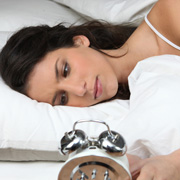At the recent October 2009 American Academy of Otolaryngology-Head & Neck Surgery Foundation Annual Meeting & OTO Expo in San Diego, California a paper with attention getting information was presented. A study,which was lead by Dr. Nora Siupsinskiene from Kaunas University of Medicine in Lithuania, indicates a correlation between upper gastrointestinal tract pathology and obstructive sleep apnea (OSA).
"To our knowledge, until now no study was published on evaluation of upper G.I. tract endoscopic findings in patients with obstructive sleep apnea syndrome versus snoring patients", states Dr. Siupsinskiene. (1)
The case subjects included 42 adults who were diagnosed with OSA and 13 adults who were classified as snoring-only and served as the controls. The OSA patients experienced at least five episodes of sleep apnea per night. All of the patients underwent an upper G.I. endoscopy to evaluate G.I. health.
Obstructive sleep apnea is caused by a blockage of the airway, which usually occurs when the soft tissue in the back of the throat collapses during sleep. Approximately 12 million Americans suffer from sleep apnea. (2) This disorder is noted in adults and children, men and women. However, there is an increase in the risk factors among males, overweight individuals, those over the age of 40, persons who have large tonsils, and anyone with a family history of sleep apnea.
Evaluation of the data concluded that pathological gastrointestinal incidences were noted in 83.3% of the OSA patients and 84.6% of the control or snoring-only patients.Cases of two or more G.I. findings were 59.5% among the OSA group and 76.9% of the controls. The most common G.I. findings discovered in the OSA group with 64.3% displaying hiatal hernias, 45.2% had grade A erosive esophagitis, histological esophagitis and erosive gastritis equally appeared in 21.4%. To a less degree, 7.1% had a duodenal ulcer and 4.8% had biliary reflux. There was a similar distribution in the snoring-only patients. It was noted that no direct correlation existed between the severity of OSA and the frequency of gastrointestinal findings.
Dr. Siupsinskiene recommends that individuals who have been diagnosed with sleep disordered breathing, regardless of the severity, should consult a gastroenterologist for evaluation. (1)
(1) www.medscape.com
(2) www.sciencedaily.com
Maryann Gromisch is a registered nurse with clinical experience in the area of medical and surgical nursing, critical care, and gastroenterology in a private practice setting.





Add a Comment4 Comments
Hi Anonymous,
We are glad you found our site to help you. Please sign up, it’s free and you can always get updates on this specific subject as more research and information pours in. Good Luck!
June 20, 2010 - 10:46amThis Comment
Yours is the first article I've run across in over a year of researching OSA and GI track problems. I was on a CPAP machine for 18 months with sever allergies to the air going in. I resolved it somewhat with a larger face mask but is still was allergy causing. I had been a snorer for over 10 years and was diagnosed with severe sleep apnea in 2/08. I've always been a sweet tooth as well and because of bone aches I started on 2 calcium citrates in 2008. Whatever the reason I developed severe LPR which went undiagnoised for 4 months. I was told by every Dr I saw that it was an allergy to take a nose steroid. After terrible suffering I finally requested an allergy specialist. After a 3 minute exam he told me I didn't have allergies I had silent acid reflux. He did exhaustive allergy tests, sinus head scan, throat culture, blood work as well. So little has been done to understand this aliment. All the literature I was handed & researched said to eliminate certain foods. No one ever mentioned anywhere to eliminate vitamine suppplements. That would have helped tremendously. Even though I was put on Nexium at 40 mg x2 day it helped somewhat. I developed phneumonia in Feb 10 & my blood pressure shot to 180/95. I knew it was the Nexium. I quit it knowing that I would suffer w/ sever reflux. My blood pressure came down normal. My LPR continued and I had a hernia/fundo mid-May '10. 3 weeks before surgery I accidently noticed that when I took Calcium citrate (now up to 4 x a day) I seared. I looked it up on the net and found that citrate should never be taken by someone with LPR/Gerds. I'm 4 weeks post op and have suffered terribly with continued burning LPR even after surgery. I found that my meds for pain after sugery exasperated my burning (IBUPROFEN & OXICODINE). I stopped it within a week. No Dr paid attention to medications that could exascerbate LPR. Not sure if surgery was successful as I burned up until 3 days ago. I've been careful not to take anything that causes acid. I've noticed that eliminating all sugar in the diet helps. There must be a connection to sugar, weight and maybe glucose control and sleep apnea. So glad this site promotes women studying and researching illnesses that not much research has been done on. I know there is an answer to LPR and I will continue to study on my own as the Drs are not able to say why I continue to suffer with LPR.
June 20, 2010 - 10:35amThis Comment
Why are blatant advertisements allowed here? This is supposed to contain health-related comments, not ads.
December 31, 2009 - 10:48amThis Comment
Glad to see the subject covered in depth here. Now if the medical community could also see the connection to gastric insufflation due to the use of single-pressure CPAP machines for patients with both apnea and hiatal hernias (caused by GERD), we would see more compliance with apnea treatments.
October 29, 2009 - 5:36pmThis Comment